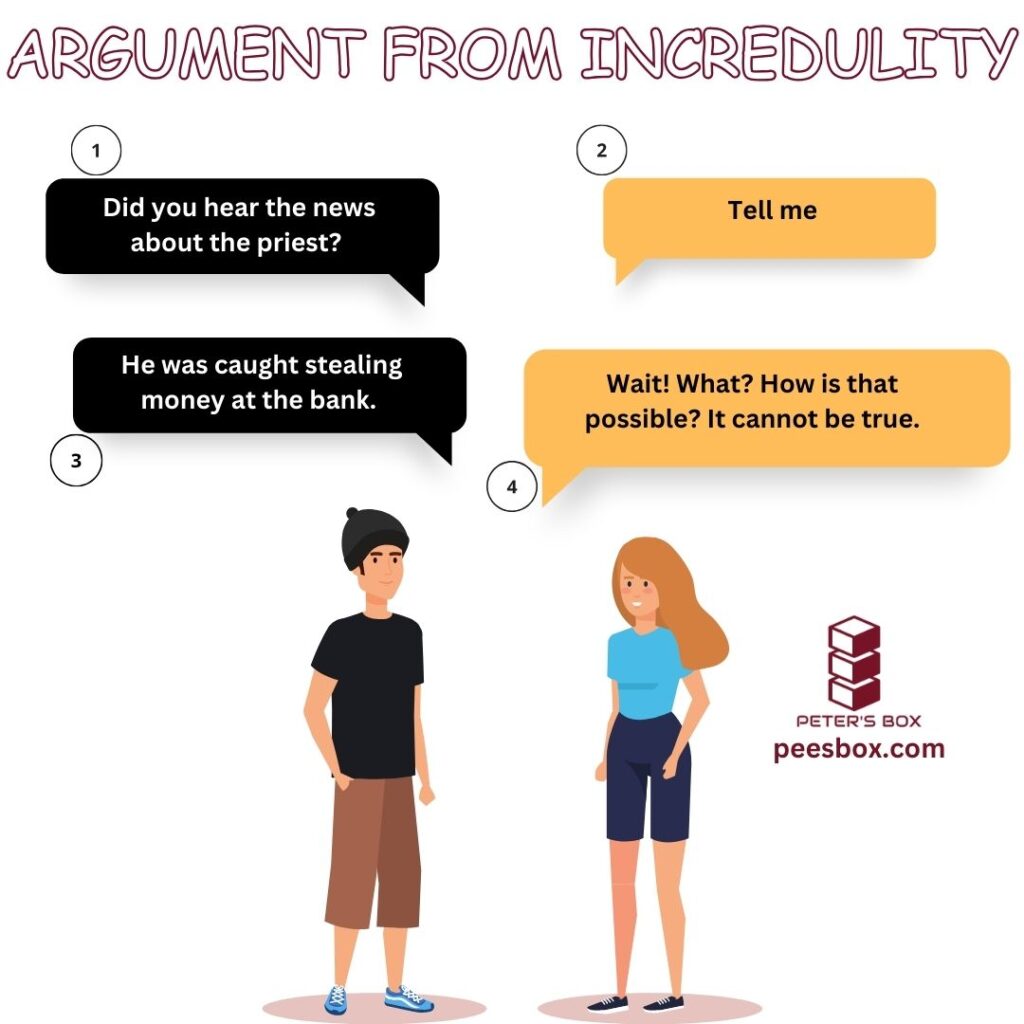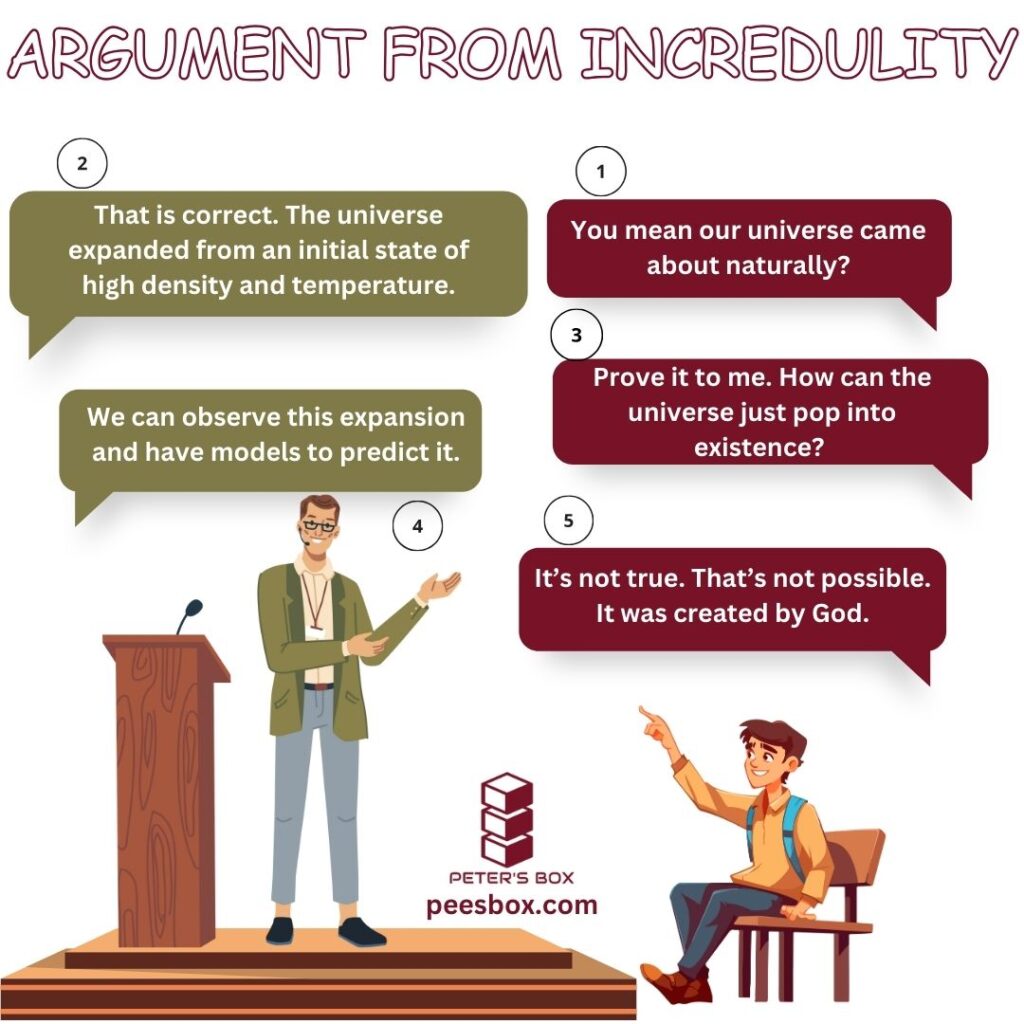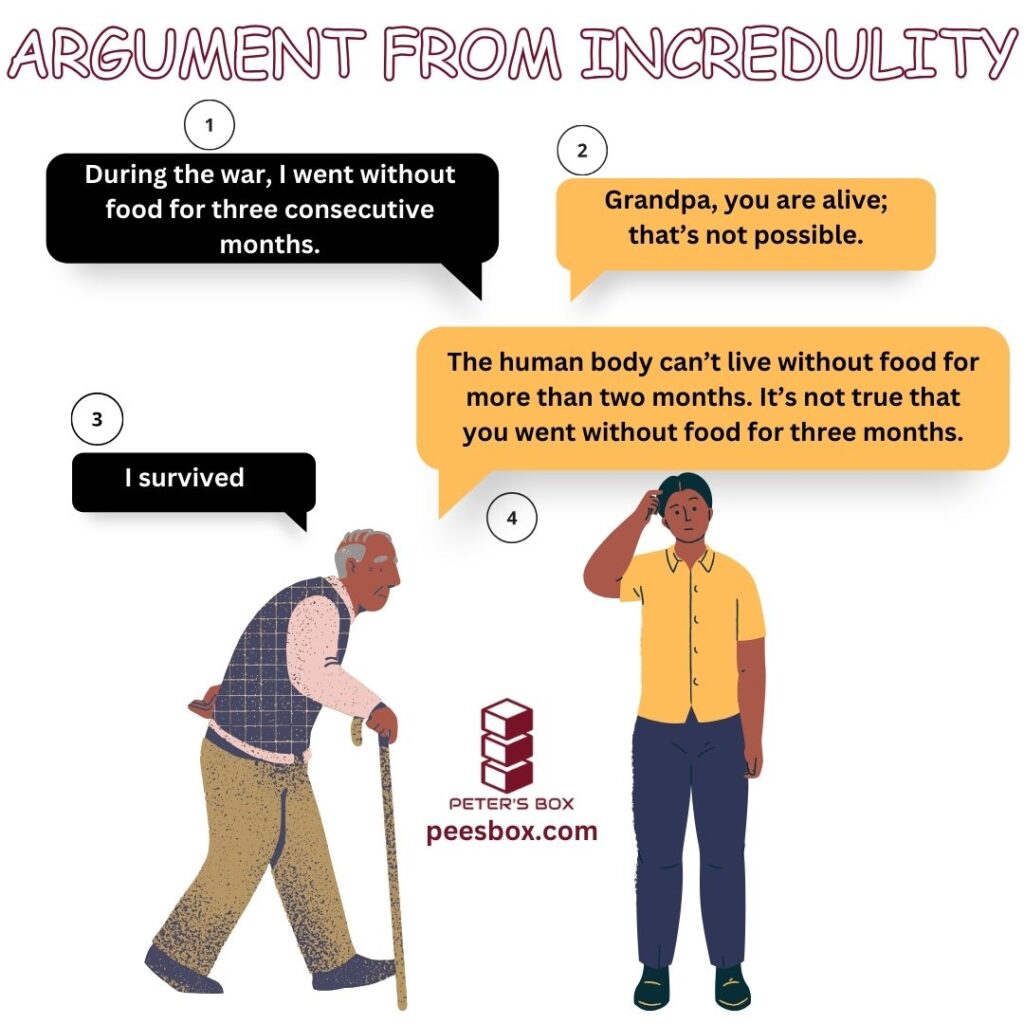Last updated on September 18th, 2023 at 06:58 am
An argument from incredulity is a logical fallacy I like to call the ‘how is this possible?’ fallacy. You will understand why in a second. If you’re not acquainted with logical fallacies, check out the post ‘Beware of the Beast: An Introduction to Logical Fallacies‘ for a quick primer.
What is a logical fallacy?
A logical fallacy is an error in reasoning. It is a flaw that weakens the strength of an argument. It does not always follow that the conclusion is incorrect. It only indicates that the supporting premises (reasons) that were utilised to support the conclusion are flawed and hence not compelling. Furthermore, if you come across a faulty argument, it is preferable not to accept the conclusion unless you are convinced differently. A logical fallacy is the use of defective or otherwise flawed thinking in the creation of an argument that, if overlooked, appears to be well-reasoned.

Argument from incredulity is very common
The argument from incredulity fallacy, like the argument from ignorance fallacy, is frequently used to avoid admitting our ignorance. Most of the time, when people make the ‘Argument from Incredulity’ fallacy, they are in such a state of shock that nothing appears plausible to them. Have you ever laughed unintentionally at a claim or argument you heard because it didn’t make sense to you? Or have you ever said anything like, “I can’t believe how that’s possible,” in response to an argument?
If you have, you are already familiar with the workings of the Argument from Incredulity. The Argument from Incredulity fallacy is sometimes called appeal to incredulity or lack of imagination.

Definition
An argument from incredulity is a logical fallacy that uses the inability to comprehend or conceive how a claim may be true or untrue as the reason to reject or accept a claim as true or false. Let’s start with a basic definition. The noun form of the adjective incredulous is incredulity. To be incredulous is to be doubtful, unwilling, or unable to believe. Incredulity, then, is the state of unwillingness or inability to believe something. Therefore, an argument from incredulity is the conclusion reached that a claim, argument, or idea is incredible, impossible to believe, and hence false.
Structure
The fundamental structure of an argument from incredulity is as follows:
- A claim appears to be impossible or unbelievable; the listener finds it difficult to comprehend it and therefore concludes that it must be false. OR
- I cannot imagine how A could possibly be true; therefore, it must be false. OR
- I cannot imagine how A could possibly be false; therefore, it must be true.
Example #1
Kofi: Did you hear the news about the priest?
Ama: Tell me.
Kofi: He was caught stealing money at the bank.
Ama: Wait! What? How is that possible? It cannot be true.

Ama has used the argument from incredulity fallacy in this example. Ama’s thinking is that since she cannot comprehend how a priest could be involved in theft, the priest could not have stolen the money.
Example #2
Kofi: Who won the 100-metre race at the recent high school games?
Ama: Jones emerged as the first-place winner of the 100-metre race.
Kofi: Jones? The fat boy from Destiny High School?
Ama: Yes.
Kofi: Find something better to tell me. I’m not ready for jokes today. It can’t be true.

In this example, Kofi has committed the argument from incredulity fallacy. The fact that Kofi concluded that Jones winning the 100-metre sprint “can’t be true” makes Kofi guilty of the fallacy. Kofi would not have been guilty of the fallacy if he had simply responded, “Find something better to tell me; I’m not ready for jokes today.” This is because, in order for the argument from incredulity to be committed, a positive conclusion that the claim cannot be true must be made.
Common formats
There are certain typical statements used in arguments that will most likely indicate that an argument from incredulity fallacy has been committed or is about to be committed. Here are a few examples:
- Are you sure of what you are saying?
- Do you really expect me to believe that?
- This is basic common sense.
- That’s not possible!
- How is this possible?
Divine fallacy
The argument from incredulity fallacy gets used in a number of scenarios, some of which have been given unique names. The most prevalent kind arises during science versus religious debates. Here’s how it goes:
Kofi: Humans evolved over billions of years.
Ama: How can humans, such complex beings, be created by random chance? How is that possible? It is not true. Humans were created by God.
The divine fallacy is the particular term for this type of argument from incredulity. Ama’s inability to fathom how humans evolved over billions of years is presented as irrefutable proof that evolution is not true in the divine fallacy scenario.
The Big Bang Theory
Picture this: A scientist is delivering a lecture on the Big Bang theory, which describes how the universe came into being. After the lecture, the floor is open for questions from the audience. Here’s a conversation that ensued between an audience member and the scientist:

Audience member: You mean our universe came about naturally?
Scientist: That is correct. The universe expanded from an initial state of high density and temperature.
Audience member: Prove it to me. How can the universe just pop into existence?
Scientist: We can observe this expansion and have models to predict it.
Audience member: It’s not true. That’s not possible. It was created by God.
The audience member cannot comprehend how the universe might have come into being spontaneously. This is because this audience member believes the universe was created by God. The audience member comes to the conclusion that the scientist’s claim is false since it is not possible because it defies their worldview and is such a bold assertion for them to accept.
Exception to the rule
Simply because someone considers a claim implausible does not imply that the person has committed a logical fallacy. If someone answers a claim by making any of the following claims, it is merely a reaction to the claim and not a fallacy:
- I can’t see how this could be true.
- This is ridiculous!
- How’s is this possible?
It becomes a fallacy when it is concluded that the claim must therefore be false.
Why Argument from Incredulity is a fallacy
An argument from incredulity is flawed because it rejects a claim without offering a strong justification for why the claim is true or false. The conclusion reached is generally due to a shortcoming in human understanding. Our understanding of any particular claim may be incomplete, flawed, or limited. The truth of a claim is independent of whether it is believable. Don’t we hear unbelievable news every day that turns out to be true?
I can boil and freeze water at the same time
Would you believe me if I told you that I can boil water and freeze it at the same time?
If you respond, ‘How’s that possible?’, you have not committed an argument from incredulity. However, if you respond, ‘How’s that possible? It is not true,’ then you have committed the argument from incredulity fallacy. It’s understandable that this claim is quite outrageous, but that does not mean it is not true. You would be wrong to say that it is not true just because it is unbelievable.

Just so you know, water can boil and freeze at the same time. It’s a phenomenon called the triple point, which occurs when the pressure and temperature are perfectly set for the three states of a substance—solid, liquid, and vapour—to coexist in equilibrium. Water reaches its triple point at 0.01 degrees Celsius and at a pressure of 0.006 atm (atmospheric pressure). Click here to listen to an astrophysicist explain how the triple point of water occurs.
One more example
Grandfather: During the war, I went without food for three consecutive months.
Grandchild: Grandpa, you are alive; that’s not possible.
Grandfather: I survived.
Grandchild: The human body can’t live without food for more than two months. It’s not true that you went without food for three months.

How to Avoid
Avoiding fallacies allows you to concentrate on making your arguments as sound as possible. A strong argument’s advantage may be the difference between life and death.
- Ask for evidence before dismissing a claim.
- Ask for clarification before dismissing a claim. Ask as many questions as you can about the claim.
- It’s possible you may have misunderstood the claim.
- Understand that truth doesn’t depend on your ability to believe in order to be true.
Related Fallacies - Argument from Ignorance
The argument from incredulity is similar to the argument from ignorance, but they are not the same. The argument from incredulity holds that a statement must be true or incorrect because it violates one’s personal beliefs or is difficult to imagine. The argument from ignorance, on the other hand, uses the lack of evidence to reject or accept a proposition as true. Click here to learn more about the argument from ignorance.
What’s next in Peter’s Box? ¡Hasta luego amigos!





